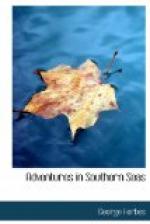On our arrival at Amsterdam Hartog arranged for the disposal and division of our treasure. He and I, as joint promoters of the expedition, each took to the value of twenty thousand English pounds, giving the remainder to be divided among our officers and crew, who had never in their lives before looked to possess so much money. The ship was put out of commission, though, for the present, we determined not to sell her. Hartog promised himself a spell ashore, and I also looked forward to a life of ease and recreation. I was now a rich man, with more wealth to my credit than would satisfy my simple needs for the remainder of my life. Why then, I asked myself, should I seek further peril and adventure in unknown lands to gain money of which I already possessed more than I knew what to do with?
I did not return to my estate, which had become distasteful to me, recalling, as it did, the brief span of nuptial happiness which I had enjoyed with Anna, and when, later, my father-in-law, the Count of Holstein, offered to buy it from me, I was glad to sell it to him. With a portion of my capital I now secured a full share in the business of De Decker, my old master, and, having purchased a fine house at Amsterdam, I resolved to settle down to the lucrative business of a merchant.
Before taking possession of my new home I paid a visit to my family at Urk, where I found that my father had retired from the active management of his fishing business, which was now carried on by my eldest brother, who was married, and blessed with three sturdy boys. My two younger brothers were also married, and both had begun to rear families.
“Only you, Peter,” said my mother, “my favourite son, the flower of the flock, are alone and childless.”
I had not, since Anna’s death, given a thought to marrying again, but my mother’s words appealed to me with some force when I reflected that I owed it to my country not to lead a life of selfish celibacy. I would never love with the strength of my first love which I had given to Anna; but there seemed to be no reason why I should not become the head of a house, and the father of a family, so that I might live again in my children.
Now, it so fell out that Pauline Rutter, a niece of De Decker, came at this time to stay with her uncle at Amsterdam, and as I was a frequent visitor at De Decker’s house, I often met her. Pauline was proud, dark, and self-willed—the very opposite of what Anna Holstein had been when I married her, and for this reason, perhaps, I liked her the more, since it put an end to all comparison between her and Anna, to whom I had given my first love.
Pauline was flattered by the attention I paid her, and when at length I asked her to become my wife she made no secret of her satisfaction at the prospect of becoming Madam Van Bu.
“I have always thought, sir,” she said, “that you would marry again. It is a duty which you owe to your wealth and position. That your choice should have fallen upon me is an honour of which I am very sensible.”




